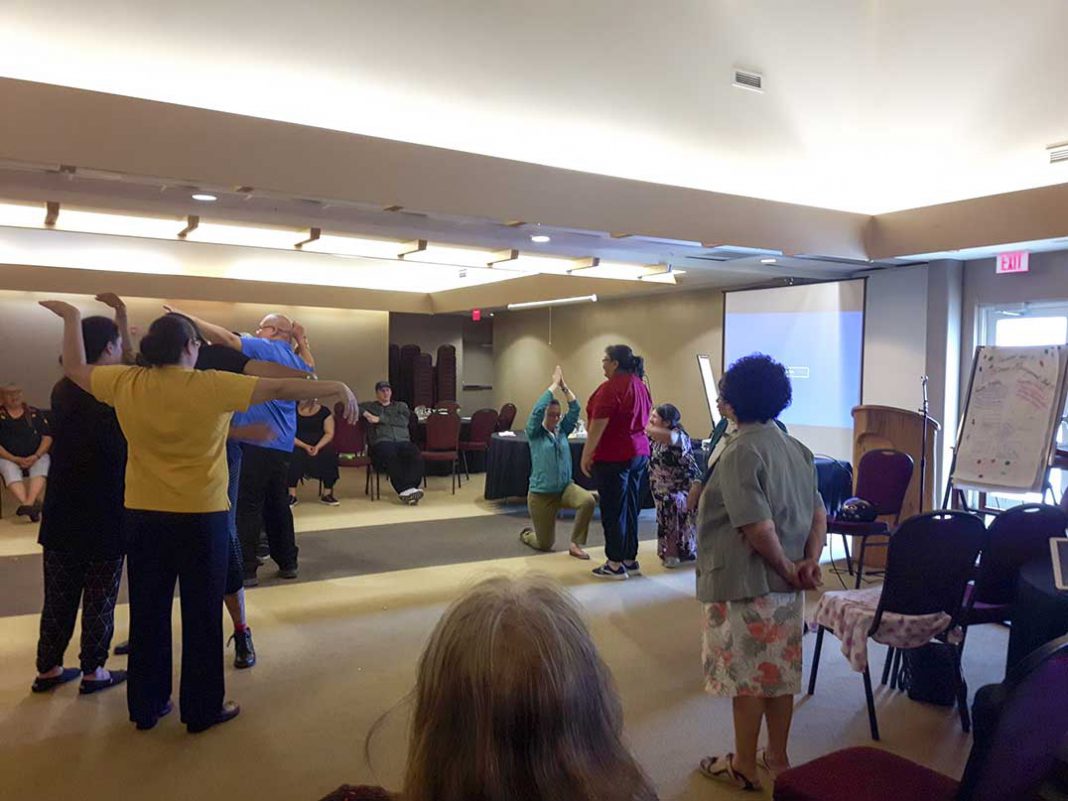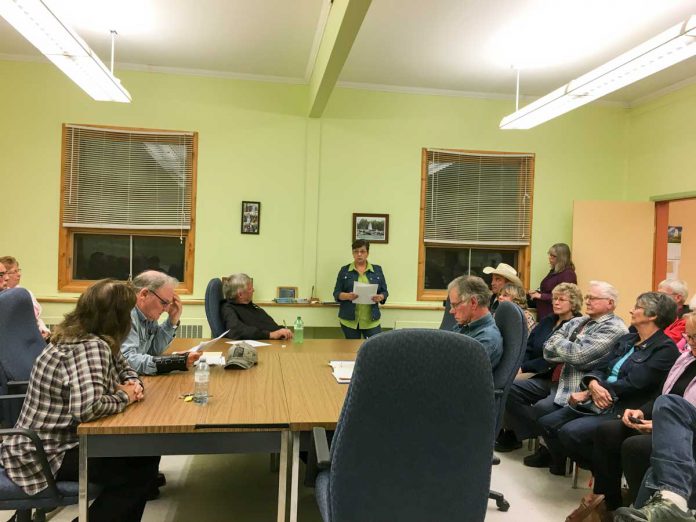LITTLE CURRENT–‘Working with vulnerable persons – respect and resiliency’ was the them of a Victim Respect Conference held June 12 and 13 at the Manitoulin Hotel and Conference Centre in Little Current. The conference was organized by Wiikwemkoong’s Justice Program.
Wiikwemkoong Justice staff chose speakers “who were well informed on the topics which cover the areas of work that we (Justice, other Wiikwemkoong agencies and front line staff) are involved with when working with persons who require the support of some form of remedial help either through services, agencies or collaborative programming,” said Frances Mandamin, a victim wellness support worker with the Wiikwemkoong Justice Program who assisted with event coordination. “From elder vulnerability to support for those persons which require assistance from a program agency to possible further referrals or development of a workshop that pertains to wellness and support of our community.”
Following an opening smudge and prayer and welcome remarks by Wiikwemkoong Ogimaa Duke Peltier, speaker Graham Webb presented on the Advocacy Centre for the Elderly. Mr. Webb works with aged persons as pertaining to legal assistance and intervention. Additional information is available on their website, www.acelaw.ca.
Next up, three panel embers from Wiikwemkoong provided testimonials of overcoming their personal situations as victims, with emcee Bea Shawanda moderating. “The Victim Resiliency panel members are from Wiikwemkoong and are well-respected elders from our community who either work with or have experienced trauma in their lives and have overcome the hurdles of life’s challenges through the support of family and community,” said Ms. Mandamin.
After lunch, Michael Shain and Charlene Tehkummah provided an overview of the Manitoulin Legal Clinic located in Aundeck Omni Kaning and shared their work experiences in working with victims from WSIB cases, and the cultural trauma of persons moving from a First Nation into an urban centre; how through the help of free legal clinics they were able to assist the clients in seeking the remedial assistance to address the issues on hand. Their presentations talked about the resiliency of their clients to overcome the situation and through support of the legal clinic and services to develop the resolution to the matter on hand. Contact the Manitoulin Legal Clinic at 705-368-3333.
Scott Clark and Chantal Maru spoke about their research on community based models of victim services throughout the country and how Wiikwemkoong has maintained a model of using Justice as healing through the diversion program and working in unison with staff, Wiikwemkoong programs and the Elders’ Justice Panel members who are integral to the support of persons who utilize the support of the Justice Circle.
Day two began with Wiikwemkoong cultural teachings. “The importance of cultural teachings and ceremonies spoke to the history and lifestyle of the community and how words of the Seven Grandfather teachings were practiced by action and taught to the young,” explained Ms. Mandamin. “The residential school era really impacted our families; however, our grandparents and elders thrived on continuing these teachings and ceremonies that were handed down and are very much respected to this day. The ceremonies play an important role to the traditional teachings which were handed down from our ancestors to our current day traditional people. These teachings are important to our Justice program and circles.”
Tim Ominika of Northwood Recovery presented the role of clinics and how land-based activities and after care are significant to participants who require recovery from opioids. Mr. Ominika explained the Northwood program and shared how this program has assisted a specific person (through his testimonial on the road to his recovery), providing an inspirational testimony of success and resiliency. Connect with a community access point at 705-859-3280.
Bea Shawanda, an international storyteller/traditional dancer/language speaker originally from Wiikwemkoong, has been involved in social justice issues since the 1980s, specializing in trauma and recovery work. Ms. Shawanda provided a presentation on compassion fatigue of the worker and how we must take care of ourselves as the helper.
Marion Jacko spoke about her role and responsibilities as the Children’s Lawyer for Ontario (OCL). The OCL has two departments, property and personal. Property works with estates and trusts, civil litigation and minor’s funds. Personal deals with custody and access disputes and child protection/child welfare cases. Ms. Jacko shared that in Ontario there are over 10,000 files open relating to 18,000 children. That breaks down into approximately 23 percent custody and access disputes, 47 percent child welfare, eight percent for minor’s funds and the remaining 22 percent split between civil litigation and estates. “I wish my office didn’t have to exist,” she said.
Ms. Jacko highlighted three new programs: Voice of the Child, 16/17-year-old program and a human trafficking pilot project. Voice of the Child provides a short report by a clinician that contains only the child’s preferences, generally for custody and access or protection cases. This report is helpful to judges for decision-making but does not make recommendations.
As of January 2018, 16 and 17-year-old youth can enter into a voluntary youth service agreement (VSA) in order to receive services and assistance from Children’s Aid Services if they are determined to be in need of protection. Lawyers will guide the youth through the process and provide them with information and advice.
Previously, 16 and 17-year-olds had to access adult services and sometimes ended up homeless. When youth enter into a VSA before they are 18 they have access to services until their 20s. Since January 1 nearly 300 VSAs have been entered into with youth in varying situations. “They may be transgender, have mental health or addictions issues or have parents who do. They have limited or no options,” explained Ms. Jacko.
The human trafficking pilot project came out of ‘Walking Together: Ontario’s Long-term Strategy to End Violence Against Indigenous Women.’ One initiative under this project is a new type of restraining order specific to human trafficking; application can be made by the victim, families of the victim, guardians or other persons. Free legal representation will be provided to survivors through this project, which is a partnership between Victim Services and the Children’s Lawyer’s office.
“Human trafficking is vastly underreported,” said Ms. Jacko, “and Ontario is a major centre for human trafficking in Canada, with two-thirds of the reported cases. In Ontario, Indigenous women and girls are one of the most targeted and overrepresented groups. The average age targeted is 13-years-old but is often within the 8 to 16-year-old range.”
There are misconceptions about the victims, she said. “Not all are addicted. Most are just trying to survive.” Not all human trafficking victims are sex workers. They are also forced into labour and can be found as domestic servants, hair and nail salon workers, janitorial workers, hotel service workers and more.
Signs to watch for include new boyfriends or friends, older friends, unexplained money, a change in appearance, secretive or aloof behaviours, withdrawal, skipping school, unexplained injuries, substance abuse, new phones or technologies or tattoos. “Often victims are branded with a tattoo, identifying them as belonging to a particular ‘stable’ of victims,” said Ms. Jacko.
“One thing I’ve learned,” she concluded, “is not to judge. The best thing we can do is to surround the survivors with love and caring.”
Contact the Office of the Children’s Lawyer at 416-314-8000. Survivors and parents or guardians of those who are risk of being trafficked can call the Human Trafficking Helpline at 1-833-999-9211.
The conference wrapped up with Bea Shawanda, gamely assisted by Dorothy Fox, leading group activities that promote laughter and humour, leaving everyone with good vibes and smiles. “Stress is destructive,” she said. “Laughter builds self-confidence and builds relationships with other people. It will decrease your own stress levels and teaches you to take (good) risks.” Ms. Shawanda uses humour as a tool to say what needs to be said, warning participants, “Don’t take yourself too seriously.”





